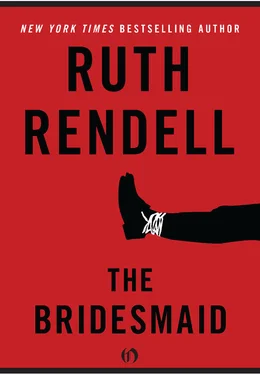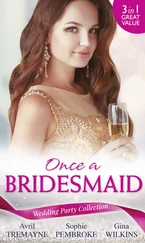Ruth Rendell - The Bridesmaid
Здесь есть возможность читать онлайн «Ruth Rendell - The Bridesmaid» весь текст электронной книги совершенно бесплатно (целиком полную версию без сокращений). В некоторых случаях можно слушать аудио, скачать через торрент в формате fb2 и присутствует краткое содержание. Год выпуска: 2010, Издательство: Open Road Integrated Media LLC, Жанр: Триллер, на английском языке. Описание произведения, (предисловие) а так же отзывы посетителей доступны на портале библиотеки ЛибКат.
- Название:The Bridesmaid
- Автор:
- Издательство:Open Road Integrated Media LLC
- Жанр:
- Год:2010
- ISBN:нет данных
- Рейтинг книги:3 / 5. Голосов: 1
-
Избранное:Добавить в избранное
- Отзывы:
-
Ваша оценка:
- 60
- 1
- 2
- 3
- 4
- 5
The Bridesmaid: краткое содержание, описание и аннотация
Предлагаем к чтению аннотацию, описание, краткое содержание или предисловие (зависит от того, что написал сам автор книги «The Bridesmaid»). Если вы не нашли необходимую информацию о книге — напишите в комментариях, мы постараемся отыскать её.
The Bridesmaid — читать онлайн бесплатно полную книгу (весь текст) целиком
Ниже представлен текст книги, разбитый по страницам. Система сохранения места последней прочитанной страницы, позволяет с удобством читать онлайн бесплатно книгу «The Bridesmaid», без необходимости каждый раз заново искать на чём Вы остановились. Поставьте закладку, и сможете в любой момент перейти на страницу, на которой закончили чтение.
Интервал:
Закладка:
Perhaps because his mother was so helpless and his sisters often liable to irrational fears, Philip had grown up a cool-headed person. He was like his father, who had been a practical man, and though endowed with plenty of imagination, he had learned to keep it in check. Therefore, he didn’t let himself become a prey to all kinds of unreal speculations, and by the time he reached Gants Hill and the big roundabout on the A. 12, he was quite calm again.
Flora had bounced about a bit on the backseat. When he reached the Ilford showroom, where he was due to call on his way back to the office, he transferred Flora from the back of the car to the boot, wedging her comfortably between the spare wheel and a cardboard crate of wallpaper sample books he was carrying with him. There in the car park at the back of the showroom, he was unable to prevent himself taking a look at her.
He pierced the plastic with the tip of his pen, his fingernails having failed to do it, and made a split long enough to reveal her face. She still gazed into Olympian distances, still maintained that grave but serene expression. Well, it would be something to get steamed up about if she didn’t, thought Philip.
Driving home rather later than usual—because Roy had handed him a list of customers, some of them angry or indignant, to telephone and placate—Philip reflected on his act of the morning. Why had he taken the marble girl? Supposedly because he felt she was rightly his or his family’s. It was as if Arnham had perpetrated some kind of con trick in order to gain possession of her. People shouldn’t be allowed to profit from their deceit.
But having taken her, what was he going to do with her now? Not replace her in the garden at Glenallan Close. Too many explanations would be required if he were to do that. And there was Christine to consider. He would have to tell Christine where Arnham now lived and how he had seen Flora there. It was dangerous ground this, an area he continuously shied away from. Could he perhaps say she wasn’t Flora but a Flora look-alike he had happened to see in a shop or garden centre and had bought? Hopeless, with that chip out of her ear and that green stain.
Even getting her into the house without being seen and questioned would be a problem. They weren’t one of those families whose individual members led their own private secret lives, unnoticed by and of little interest to the others. They were a close-knit family, each concerned about the others, prepared to enquire into any oddity of behaviour, each knowing pretty well where the others were at any given time and what they were likely to be doing. He imagined himself encountering Cheryl on the stairs with his arms full of Flora and her amazement and her questions.
As he thought that, while waiting in a queue of cars in the Edgware Road, watching the red light, he glanced to the right side of the street and saw Cheryl. Her name and a kind of vague picture of her had been in his mind, and then he saw her. She was coming out of what looked to him—he couldn’t see very clearly, only a crowded glittering conglomeration of colours and shapes—like a video shop or music centre. So much for always knowing where the others were and what they were doing. Cheryl was dressed in her customary jeans and black leather and she had a cowgirl’s hat on, broad brimmed, steep crowned, with a fringed leather band.
There was no reason why she shouldn’t be there. She was free, she wasn’t doing anything she shouldn’t be—or as far as he could see, she wasn’t. Philip had to drive on, he had to take his eyes from her, as the lights had gone to red and amber and a moment’s delay would set the drivers behind him all braying on their horns. There was nothing to trouble him in her presence here, but in her appearance and stance there was.
She had moved out of that doorway like a girl drugged or drunk—or exhausted or driven out against her will. The cause of her exit might have been any of those. And she was crying, the tears were running down her face. He saw her bow her head and put her fists in her eyes, and then he had to turn his eyes back to the road and put the car into gear and move fast away from her.
CHAPTER FOUR
The five girls took up their pose against the drawn curtains at Christine’s french windows. These curtains had come from her old home and were of rich, dark brown velvet, lined and interlined, light excluding. The May sunshine showed itself only as a single thin bright line on the right-hand edge of the window, and this vanished when the photographer fastened the curtain to the window frame with a piece of Scotch tape.
Philip, a little uneasy in his Moss Brothers morning coat and striped trousers, first put his head round the door, then came in and stood at the opposite end of the room. The photographer’s lights made it very hot. The photographer was an oldish man, his clothes reeking of cigarette smoke. At first, the appearance of the girls dismayed Philip. He knew he had good taste, an eye for the stylish and elegant colour combinations. If he hadn’t, he probably wouldn’t have been in his present job or have wanted it. Who had so badly advised Fee that she had got herself up in white satin, a bluish, Arctic white, stiff and gleaming as a sheet of ice? But perhaps it was all her own choice. Couldn’t she see that this patrician dress with its high throat and lean arum lily sleeves, its narrow bell skirt, was designed for a tall thin woman with a flat chest?
Her hat was the sort of thing lead actresses wore in period films of the forties. Philip had seen plenty of them on television. A kind of bowler sported by ladies sidesaddle on horseback, only this one was white with the wrong length of veil. And it was arum lilies she carried. Funeral flowers, he thought, remembering a wreath on his father’s coffin. As to the bridesmaids, being commanded to smile now, to look, not at the camera, but adoringly at Fee, he would have laughed at their costumes— what other word for them was there?—if he had seen them in a magazine.
A kind of tunic, each in a different colour—rose, coral, lemon, apricot—great puffy sleeves of some net stuff with orange spots, and bursting from tunic hem at hip level, puffball skirts of the same spotty net. Pink and orange circlets of some unidentifiable flowers on their heads. They were grotesque. Well, he thought, surprising himself, they were all grotesque but one. Cheryl, Stephanie, and Fee’s old school friend Janice were absurd figures of fun, but the other one, she was different. She was—Words failed Philip as he stared at her.
This must be Senta. She didn’t look as if connected with that family, she didn’t look as if related to anyone of their sort. She was extraordinary. This wasn’t in her height or something startling about the shape of her, for she was shorter than the other girls and very slender. Her skin was white but not what people mean when they talk about white skin—very fair or pale or creamy—but whiter than milk, white as the inner side of some deep sea shell. Her lips were scarcely less pale. He couldn’t tell the colour of her eyes, but her hair, which was very long, nearly waist length, straight and smooth, was silver. Not blond, not grey, but silver, with here and there streaks of tarnish on it.
But perhaps the most remarkable thing about her to him, the most exciting thing, was her resemblance to Flora. Her face was Flora’s, the perfect oval contour, the straight, rather long nose which described an unbroken line from its tip to her forehead, the widely separated calm eyes, the short upper lip, the lovely mouth that was neither full lipped nor narrow. If that silver hair had been piled on to the back of her head and bound with ribbons, she would have been Flora’s image.
She carried herself with patient confidence. While the others fidgeted, patting their hair between camera shots, adjusting bra straps, resettling bouquets, Senta stood as still as a statue. She was as calm and unruffled as the marble girl, thought Philip, whom three days before he had managed to sneak into the house and up the stairs while Christine finished off a trim in the kitchen. Her figure alone was not Flora’s, her body’s bone structure delicate, her waist capable of being clasped in a pair of hands.
Читать дальшеИнтервал:
Закладка:
Похожие книги на «The Bridesmaid»
Представляем Вашему вниманию похожие книги на «The Bridesmaid» списком для выбора. Мы отобрали схожую по названию и смыслу литературу в надежде предоставить читателям больше вариантов отыскать новые, интересные, ещё непрочитанные произведения.
Обсуждение, отзывы о книге «The Bridesmaid» и просто собственные мнения читателей. Оставьте ваши комментарии, напишите, что Вы думаете о произведении, его смысле или главных героях. Укажите что конкретно понравилось, а что нет, и почему Вы так считаете.











